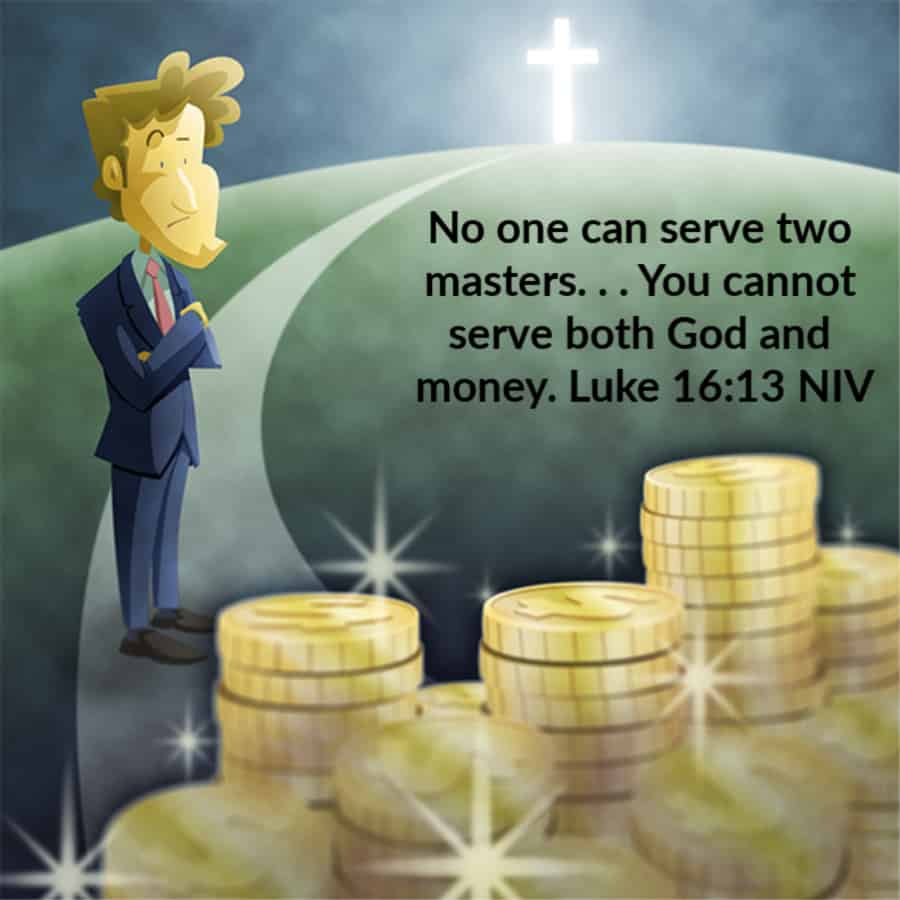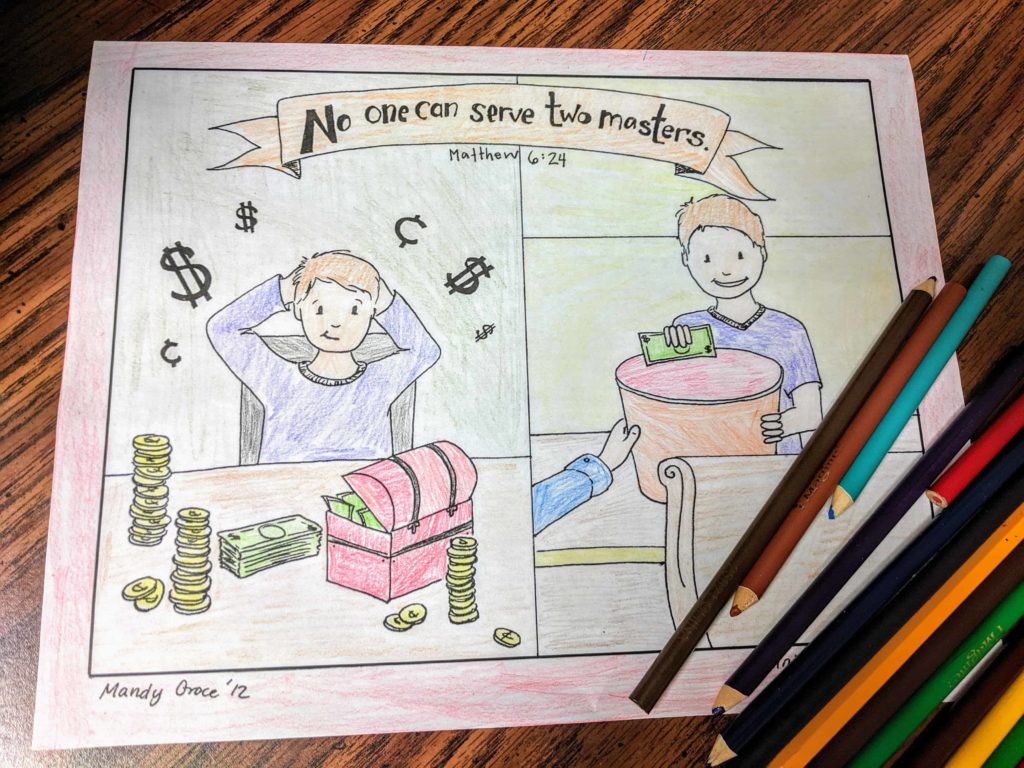Jesus said a lot about money and putting God first. This kids’ Sunday School lessons from Luke 16:1-15 will teach children about managing gifts well and stewarding wisely. Download the printable lesson plan below. We’ve included the craft, coloring pages, and teaching outline below. Enjoy and may God bless your ministry!
Stewarding Wisely… Sunday School Lesson on Managing Gifts Well
Let’s admit it: some of the parables of Christ are a lot easier to teach than others…and the parable of the shrewd manager is definitely not on the easier level! If you are visiting a story like this one, it’s helpful to build with several other verses, and focus on a general principle like stewardship. This lesson looks at the importance of managing and maintaining what God gives us, as well as putting Him first and foremost above all other things.
Lesson focus: God entrusts us with gifts like time, talents, and treasures. He wants us to use these things wisely and expects us to give them back to His control. God also wants to make sure nothing comes between us and Him.
Passage: Luke 16:1-15; Matthew 6:31-34, 1 Timothy 6:6-12,
Read more Bible verses about money and wealth.
Target Audience: Kindergarten-6th grade (See notes for specific age modifications)
Materials Needed: Construction paper; old containers/boxes; tape; scissors; decorative supplies; Bibles
Bonus Ideas:
- Compare our children’s sermon lesson on this same passage
- Compare our Lesson on the Love of Money
- Download No One Can Serve Two Masters coloring page (video explainer)
- See craft ideas about giving and stewardship
- See more lesson activity ideas on Sermons 4 Kids
- Clip art image above from Christian Clip Arts
Lesson Opening Activity
How will you use it?…Management and stewardship exercise
This opener is adaptable according to the ages of your group and how much time you have to spend on your lesson and introduction. Give students a little challenge:
- (Younger students) Tell kids that they get to open up a store. Brainstorm what they think they might need to do in preparation. What kind of store will it be? What would they need besides products? Invite kids to draw some pictures of their business and what it might include. If extra time allows, have them form groups and “act out” what their business might be.
- (Older students) Inform students that they have a certain budget, and their task is to envision a business of their own. Have them estimate how much of their budget different elements might cost, and what they would need to open a store or launch their business. Discuss what it might take and how they would apportion amounts of their money for their ideas to succeed. It isn’t easy!
Explain to students that today’s lesson has to do with stewardship, which refers to being responsible with what God gives us.
Teach: Bible Lesson from Luke 16:1-15
Begin the lesson by asking students what kinds of things we need money for. Do they get an allowance? Do they see parents using money for things? (This discussion will vary depending on audience and ages)
What should we do with our money? If someone gave you money and asked you to get them something, what might be a wise thing to purchase?
For older students, read the parable of the shrewd manager, and chat about what they think it might mean. For younger kids, focus on the last portion of it, looking at the emphasis of “choosing a master.”
If then you have not been faithful in the unrighteous wealth, who will entrust to you the true riches? 12 And if you have not been faithful in that which is another’s, who will give you that which is your own? 13 No servant can serve two masters, for either he will hate the one and love the other, or he will be devoted to the one and despise the other. You cannot serve God and money.” –Luke 16:11-13
Some people worship money, in a way. They think about it all the time, or work constantly in order to get more money. Some people are not responsible with money and run out of it easily.
Did you know that God entrusts us with everything we have? That means He gives us all things, including money. Our possessions are not really ours to keep. It’s sort of like we are borrowing what we have from God… But He also promises to take care of us.
Therefore do not be anxious, saying, ‘What shall we eat?’ or ‘What shall we drink?’ or ‘What shall we wear?’ 32 For the Gentiles seek after all these things, and your heavenly Father knows that you need them all. 33 But seek first the kingdom of God and his righteousness, and all these things will be added to you. “Therefore do not be anxious about tomorrow, for tomorrow will be anxious for itself. Sufficient for the day is its own trouble. -Matthew 6:31-34
What does this mean? We want to focus on God first and foremost in all things. We want to be wise with our resources…that is, be careful to use our things and our money in ways that will benefit others and bring glory to God.
We also want to make sure we trust God, and try to think of Him when we are planning. How can we do that? We can pray, or read our Bibles, and certainly ask ourselves (or someone we trust) what would be best.
Also, consider that the gifts God gives us are not all monetary…brainstorm with students what else God gives us, aside from money. He gives us talents, like being able to sing, or draw, or write, or dance, or make people laugh. He gives us time, which we can use to help one another or do things for Him.
These items do not have a price tag. And when we use them for God, we can be assured that we will have joy and peace. Our joy is not in things, but in the Maker of things:
But godliness with contentment is great gain, 7 for we brought nothing into the world, and[c] we cannot take anything out of the world. 8 But if we have food and clothing, with these we will be content. 9 But those who desire to be rich fall into temptation, into a snare, into many senseless and harmful desires that plunge people into ruin and destruction. 10 For the love of money is a root of all kinds of evils. It is through this craving that some have wandered away from the faith and pierced themselves with many pangs.11 But as for you, O man of God, flee these things. Pursue righteousness, godliness, faith, love, steadfastness, gentleness. 12 Fight the good fight of the faith. Take hold of the eternal life to which you were called and about which you made the good confession in the presence of many witnesses. -1 Timothy 6:6-12
If we are focused on loving temporary things or money, we will find ourselves disappointed. This is an important warning for young and older students alike. Stuff doesn’t satisfy, even if it might be momentarily appealing. Brainstorm with kids how they might find this “godliness with contentment.”
When we are thankful for what we have, and pursue Christ, there’s no time for silly yearning for things we don’t have. Let’s focus on the blessings of God!
Close with prayer and thank God for giving us amazing blessings. Ask for His help in wisely and responsibly using what He has given us.
Sunday School Craft on Stewardship
Stewardship banks (See detailed instructions and picture representations for specifics)
Help students create their own special “banks” to practice responsibility with money and planning. Encourage them to use their banks for more than just coins: prayer requests, praises, ideas, and thank yous can also fill the coffers.
- Create a simple paper bank: Decorate a large sheet of construction paper, including stickers and a verse or caption (“my tithes” or “my heart belongs to God”). Cut out a flap and attach it to another piece of paper for background.
- Recycle an old container for a bank. This works with a used coffee can, oatmeal container, tissue box, or other empty clean container. Have students (or help students) cover in construction paper or wrapping paper. Decorate as desired and cut an opening in the top.
See the written craft directions and watch the video example.
Bible Memory Verses (Luke 16:13 NIV) You Can Not Serve God and Money




